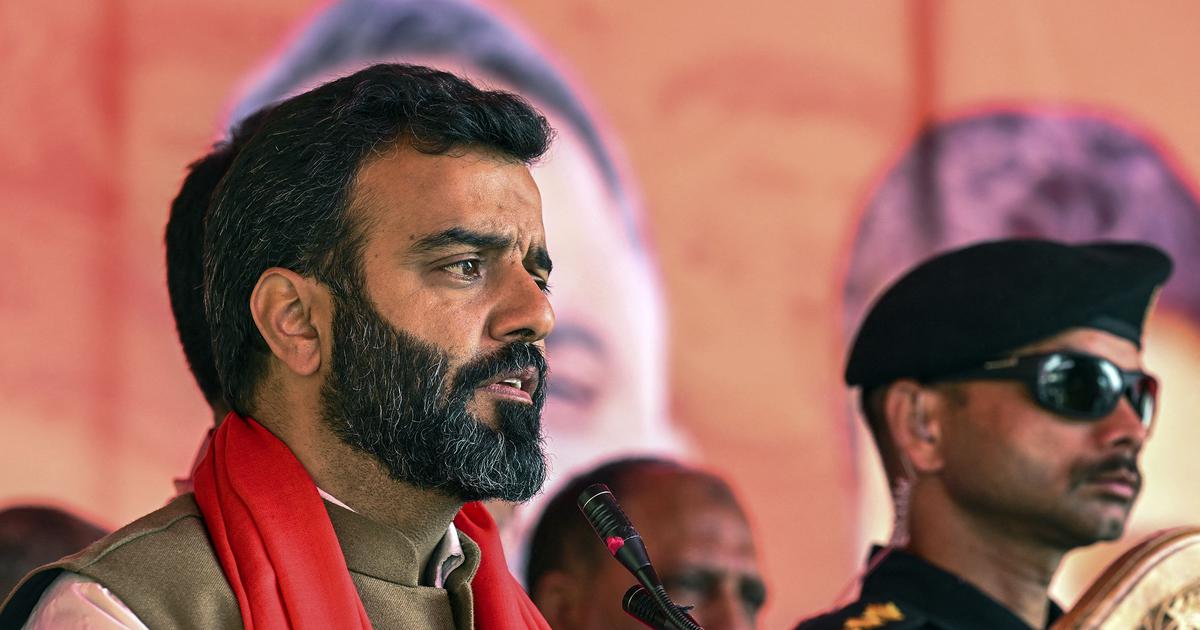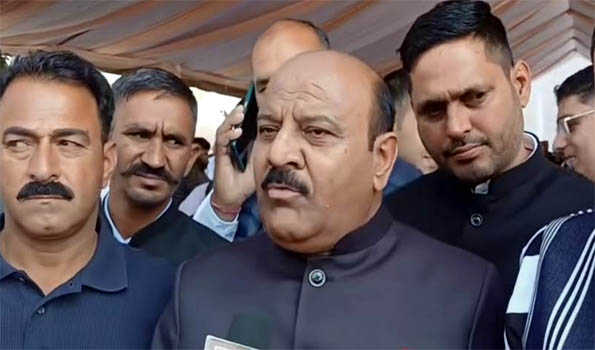Aga Ruhullah Links Hazratbal Controversy, PSA Detentions & Fight for Article 370
By: Javid Amin | 11 September 2025
A Voice of Defiance in Troubled Times
In the complex political landscape of Jammu and Kashmir, few voices resonate with as much conviction as Aga Syed Ruhullah Mehdi, senior National Conference (NC) leader and one of the Valley’s most outspoken critics of the post-2019 order. His latest remarks—“A war has been waged against Kashmiris’ identity and religion”—have reignited debate on the future of Kashmir’s politics, its relationship with New Delhi, and the moral responsibilities of its leaders.
Ruhullah’s intervention comes at a time of mounting unease:
-
Religious hurt after the Hazratbal plaque incident, where a government emblem replaced a traditional symbol at the revered shrine.
-
Political detentions under the Public Safety Act (PSA), including that of AAP MLA Mehraj Malik.
-
Economic despair, with frequent highway closures strangling trade and tourism.
-
Civil liberties under pressure, from internet shutdowns to restrictions on protests.
Against this backdrop, Ruhullah’s words strike a chord of resistance and moral urgency, demanding not just statehood restoration, but a reclaiming of autonomy, dignity, and constitutional rights lost with the abrogation of Article 370 and Article 35A.
The Hazratbal Plaque Controversy: Why It Matters
The immediate trigger for Ruhullah’s sharp critique was the Hazratbal plaque controversy. At the Hazratbal shrine—one of Kashmir’s most sacred religious sites—a government-installed plaque bearing the national emblem replaced a symbolic element tied to the shrine’s history.
Why Kashmiris Felt Offended
-
The act was seen as tampering with religious sentiment.
-
Many perceived it as an attempt to assert state authority over religious identity.
-
It sparked comparisons with a broader project of cultural homogenization, where distinct Kashmiri traditions are steadily sidelined.
Ruhullah condemned the move as “deeply insensitive”, arguing that governance should be about protecting faith and culture, not provoking wounds.
Link to Larger Identity Struggle
For Ruhullah, this wasn’t just about one plaque. It symbolized a pattern of erasure—whether through:
-
Changing laws that once protected Kashmiri identity.
-
Diluting land rights post-Article 370.
-
Or altering cultural symbols at sacred spaces.
He declared this as evidence that “a war has been waged against the identity and religion of Kashmiris.”
The Detention of Mehraj Malik: Silencing Democratic Voices
Ruhullah connected the Hazratbal controversy to the detention of AAP MLA Mehraj Malik under PSA.
A Chilling Message
-
Malik was arrested after criticizing local officials and highlighting healthcare gaps in Doda.
-
His detention under PSA—originally meant to curb timber smuggling—sent a warning to all politicians: speak too loudly, and you risk jail.
“This is not about Mehraj Malik alone,” Ruhullah said.
“It is a message to all Kashmiris: dissent will be punished, even if it is democratic.”
The PSA as a Political Weapon
-
Origins: Introduced in 1978 by Sheikh Abdullah’s government for smuggling control.
-
Today: Used against politicians, activists, and youth.
-
Impact: No trial, long detentions, and families left in despair.
Ruhullah argued that PSA has been transformed into a tool of political revenge, undermining the democratic process itself.
A Call for Conscience: Fighting Fear and Barbarism
In his speech, Ruhullah urged Kashmiris to confront their conscience and courage.
“We must abandon fear and stand firm against barbarism,” he declared.
What He Means by Conscience
-
Self-reflection: Acknowledging past mistakes of political compromises.
-
Collective courage: Resisting policies that strip away dignity.
-
Moral clarity: Refusing to normalize repression in the name of order.
For Ruhullah, silence is complicity. He called upon people to speak out, organize, and resist, insisting that only through unity can Kashmiris reclaim their rights.
Reclaiming the Broken Promise: Critique of the NC
Perhaps the most striking part of Ruhullah’s critique was his attack on his own party, the National Conference.
What He Said
-
The NC has failed to deliver on promises of statehood restoration and PSA repeal.
-
The party has drifted from its reformist roots, settling for symbolic politics rather than genuine resistance.
-
He insisted that Kashmir needs more than statehood:
“We have forgotten our fight for statehood. Statehood is not the destination—it’s the distraction.”
His Call for Change
-
NC must reclaim its reformist legacy.
-
Mobilize for constitutional justice, not just administrative perks.
-
Unite across divides to demand dignity, not merely governance.
Beyond Statehood: The Fight for Article 370 and 35A
For Ruhullah, the heart of the issue isn’t statehood—it’s the loss of Article 370 and Article 35A.
Why Articles 370 and 35A Matter
-
Article 370: Guaranteed autonomy, special laws, and political dignity.
-
Article 35A: Protected land rights and cultural identity.
-
Their abrogation in 2019 stripped J&K of its unique status and opened doors to demographic and political changes.
Ruhullah’s Argument
-
Restoring statehood without 370/35A is like “returning an empty shell”.
-
The abrogation was a political statement: that Kashmir’s sacrifices and aspirations mean nothing.
-
Any settlement that ignores this will be incomplete and unjust.
Why Ruhullah’s Words Matter Now
Ruhullah’s wake-up call comes amid multiple crises in J&K:
-
PSA Detentions of Leaders
-
From mainstream politicians to youth activists, preventive detentions erode public trust.
-
-
Economic Collapse
-
Frequent highway closures disrupt trade.
-
Tourism, the backbone of J&K’s economy, struggles.
-
Joblessness fuels frustration.
-
-
Civil Liberties Erosion
-
Internet shutdowns continue to be used as tools of control.
-
Protests are restricted, public voices muted.
-
In this context, Ruhullah stands out as a rare voice of principled dissent within mainstream politics.
A Call to Action: From Srinagar to Delhi
Going beyond speeches, Ruhullah has proposed bold steps:
-
Organizing a protest in Delhi.
-
Seeking support from 100+ MPs across parties.
-
Making a national demand for restoration of J&K’s special status.
His message is blunt:
-
Statehood is not enough.
-
Autonomy and dignity must be restored.
-
Unity is essential.
Historical Echoes: Kashmir’s Long Fight for Dignity
Ruhullah’s speech connects with a longer history of Kashmir’s political struggles:
-
1953: Sheikh Abdullah dismissed and jailed.
-
1987: Alleged election rigging sparked militancy.
-
2019: Abrogation of Article 370 ended constitutional autonomy.
Each moment reflected a crisis of trust between Kashmir and New Delhi. Ruhullah warns that continuing down this path will only deepen alienation.
Global Lens: Identity, Autonomy, and Resistance
Globally, struggles for identity and autonomy are common:
-
Scotland fights for independence within the UK.
-
Catalonia demands autonomy in Spain.
-
Palestine battles for dignity and recognition.
Ruhullah frames Kashmir’s struggle in this global context: a fight not against India, but for justice, fairness, and respect within a democratic framework.
Political Reactions to Ruhullah’s Speech
-
National Conference Leadership: Cautious silence, uncomfortable with internal critique.
-
BJP Leaders: Brushed off his remarks as “political posturing.”
-
Civil Society: Many welcomed his honesty, calling him a rare conscience-keeper.
-
Youth Voices: His speech resonated strongly with younger Kashmiris, who feel abandoned by mainstream parties.
The Road Ahead: Can Ruhullah’s Call Spark Change?
Whether Ruhullah’s wake-up call becomes a turning point depends on several factors:
-
Will NC Reinvent Itself?
-
Can the party reclaim its reformist legacy, or will it remain tied to symbolic politics?
-
-
Will Kashmiris Unite?
-
Fragmented voices need unity to demand meaningful change.
-
-
Will Delhi Respond?
-
Continued hardline policies risk alienating an entire generation.
-
Bottom-Line: Between Fear and Freedom
Aga Ruhullah’s words cut deep because they come not from the margins but from within Kashmir’s oldest political party. By linking the Hazratbal controversy, PSA detentions, and the loss of constitutional identity, he paints a picture of a society under siege—not by militancy, but by policies that erode dignity and silence dissent.
His call is simple yet profound: statehood is not enough. What Kashmir needs is justice, respect, and the restoration of its political soul.
Whether his party and the people heed this wake-up call—or whether it fades into yet another chapter of unfulfilled promises—will define the future of Kashmir’s identity and democracy.


